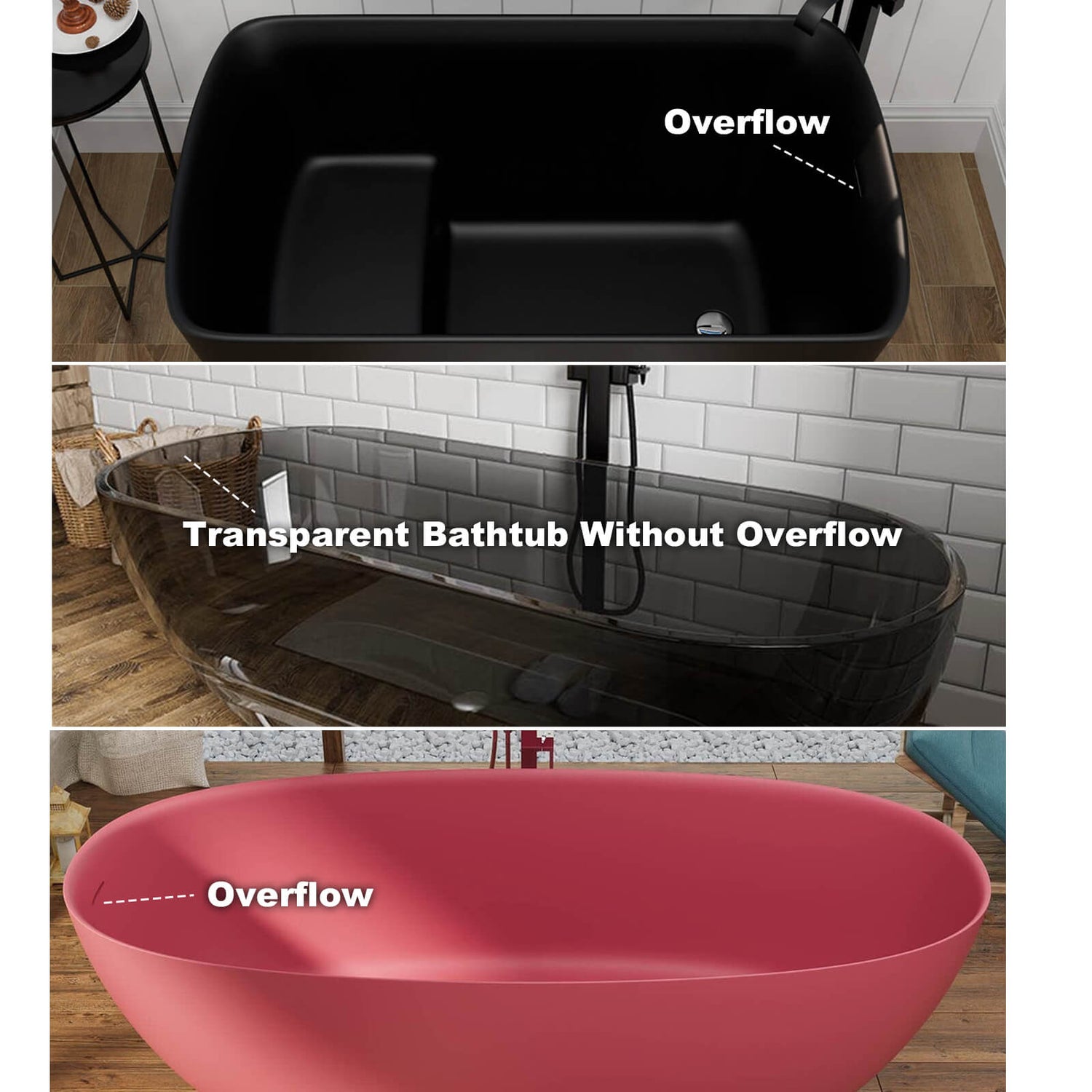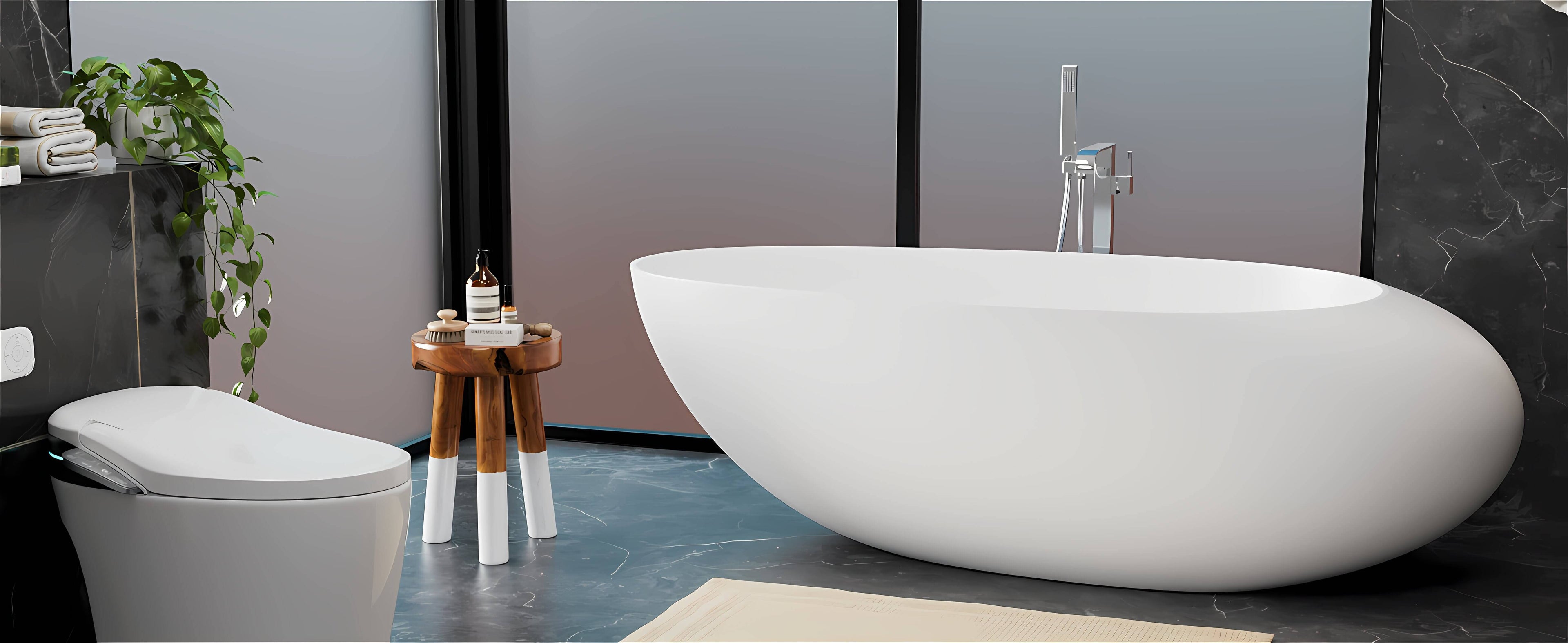When choosing a bathtub, many homeowners tend to focus on the basic dimensions such as length, width, and height. This is a great starting point, as it directly affects how well the bathtub will fit into the bathroom space. However, another crucial factor often gets overlooked — soaking depth. The soaking depth of a bathtub not only impacts the comfort level of your bath but also directly influences the retention of water temperature and the overall bathing experience. So, what exactly is the soaking depth of a bathtub, and how should it be measured and selected? In this article, Giving Tree Home will answer these questions, helping you make a more informed decision when purchasing a bathtub.

What Is Soaking Depth and How to Measure It
The soaking depth of a bathtub refers to the vertical distance from the bottom of the tub to the highest water level. For most bathtubs, this maximum water level is usually marked by the overflow drain; in the case of transparent bathtubs, it is the top edge, as these typically do not have an overflow drain.
To measure the soaking depth, you can use a measuring tape to determine the distance from the bottom of the tub to the overflow drain (or top edge). It's important to note that if you're planning to purchase a seated bathtub, make sure to confirm whether the listed soaking depth refers to the distance from the seat to the overflow drain or from the bottom of the tub to the overflow drain. At Giving Tree Home, the soaking depth we provide is measured from the interior bottom of the bathtub to the overflow drain.
Standard Bathtub Soaking Depth
| Aspect | Alcove Bathtub | Freestanding Bathtub | Soaking Bathtub | Sitting Bathtub |
|---|---|---|---|---|
| Definition | Installed against three walls, often featuring a built-in shower. | Freestanding without being attached to the wall. | Style with greater soaking depth, designed for deep immersion. | Built-in seats allow users to soak while sitting. |
| Standard Soaking Depth | 12"-16" | 13"-18" | More than 15" | 16"-22" |
| Installation Space | Ideal for small bathrooms, saves space. | Requires larger space, flexible in placement. | Needs more space, may require reinforced flooring. | Occupies less space, good for compact bathrooms. |
| Material Options | Acrylic, cast iron, enameled steel. | Acrylic, copper, stainless steel, stone. | Acrylic, cast iron, composite materials. | Acrylic, ceramic. |
| Advantages | Affordable, space-saving, functional for quick showers. | Flexible placement, versatile design, fits various decor styles. | Offers a therapeutic experience with deep immersion. | Great for seniors or those preferring to sit while soaking. |
| Disadvantages | Limited soaking depth, suitable for basic bathing needs. | Higher installation cost, requires more space. | Higher price range, occupies more floor space. | May not be in harmony with the large bathroom space. |
| Maintenance Needs | Easy to maintain, simple to clean. | Moderate maintenance, depends on material. | Requires regular cleaning and upkeep for longevity. | Low maintenance, suitable for daily use. |
| Suitable For | Small homes, renters, budget-conscious buyers. | Homeowners seeking unique design, larger bathrooms. | Those looking for a deep soaking, spa-like experience. | Seniors, people with limited mobility, or fans of sitting baths. |
| Recommended Settings | Compact bathrooms, rental apartments. | Master bathrooms, standalone bath spaces. | Luxury bathrooms, home spas. | Secondary bathrooms, elderly-friendly spaces. |
| Price Range | $300 - $1000 | $600 - $3000 | $600 - $2500 | $700 - $1500 |
How to Choose the Right Soaking Depth
Height
The soaking depth determines how much of your body will be submerged in the water during the bath. This coverage will vary depending on the user's body type. To achieve a better soaking experience, the bathtub should be deep enough to cover most of the user's body, including the shoulder area, during the bath.
- For taller individuals: If you are over 6 feet tall, a soaking depth of around 15 inches is ideal. Additionally, pay attention to the length of the tub to ensure you can lie down comfortably.
- For shorter individuals: Shorter people may prefer a shallower tub, as an excessively deep tub can feel uncomfortable, especially if the water level reaches just below the neck, which might feel too deep.
Soaking Duration
The soaking depth is often directly proportional to the water capacity of the bathtub. More water capacity means better heat retention. If you enjoy soaking for a long time in warm water, a deeper tub might be more suitable for you.
However, some homeowners might be concerned that increased water capacity could lead to higher water bills. Is there a way to balance water conservation with prolonged soaking? Opting for an acrylic bathtub could be a good idea. Due to its manufacturing process, acrylic bathtubs feature a hollow insulation layer, which helps retain water temperature. Even in bathtubs with a shallower soaking depth, you can enjoy a prolonged soak without worrying about significant temperature drops. In fact, the water temperature only decreases by about 20 degrees over a 50-minute period, making it an excellent choice for long soaks.
Bathtub Types
Different types of bathtubs offer various depth options. The main categories include traditional bathtubs, soaking tubs, and Ofuro bathtubs, each with its specific design and suitable depth range.
- Traditional bathtubs: Generally have a depth of 13-15 inches, making them suitable for everyday use and basic cleaning during baths.
- Soaking tubs: These typically have a depth of 15 inches or more and are designed specifically for deep soaking, perfect for those who want to enjoy a full-body soak and relaxation.
- Ofuro bathtubs: A type of Japanese wooden bathtub, usually round and relatively small, with soaking depths that often exceed 24 inches. It's worth noting that the purpose of an Ofuro is for therapeutic soaking rather than bathing, so it is not recommended to use soap or other bathing products while soaking in it.
Ending
When selecting a bathtub, it’s essential to consider factors such as your body type, soaking preferences, and available bathroom space. By understanding and paying attention to the soaking depth, you can enhance your bathing experience and make a choice that best meets your needs.
More Ideas
-

10 Half Bathroom Ideas to Maximize Style in Small Spaces
You may find it hard to refresh the half bathroom space that you already have, but don't worry; we've some great small half bathroom ideas that would come handy to...
-

Top 10 Bathroom Shelf Ideas to Maximize Space and Style
Discover the top 10 bathroom shelf ideas to maximize space and add style. From floating shelves to rustic designs, explore the best bathroom storage solutions.
-

Bathroom Vanity Height Selection Guide
Find the perfect bathroom vanity height for comfort and functionality. The standard height is 30"-34", while a comfortable height for taller users is 36". Learn how to choose the best...
-

6 Creative Black Bathroom Design Ideas
Black has become a popular choice in modern bathroom design, adding sophistication, luxury, and drama. Whether as an accent or primary color, it transforms spaces with sleek tiles, bold vanities,...
-

How to Use a Toilet Seat Cover
Toilet seats are breeding grounds for bacteria. To maintain hygiene and avoid direct contact with dirt in public restrooms, using a toilet seat cover is the best solution. It's simple,...
-

6 Design Tips to Hide the Toilet in Your Bathroom
Especially in today's pursuit of minimalism and high-end design, finding ways to cleverly "hide" the toilet and create a more harmonious and luxurious bathroom space has become a common goal...







